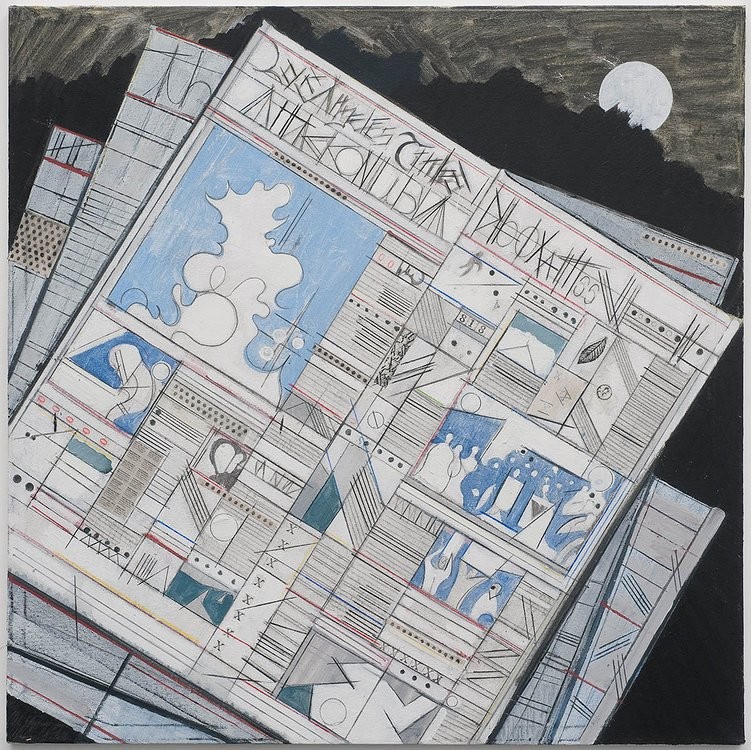David Korty
02 Apr - 07 May 2011

© David Korty
LA Times (Attack on Libya) with Full Moon, 2011
Oil, Pencil, Paper, Wax on Canvas
36 x 36 inches
LA Times (Attack on Libya) with Full Moon, 2011
Oil, Pencil, Paper, Wax on Canvas
36 x 36 inches
DAVID KORTY
2 April - 7 May, 2011
David Korty presents a series of abstracted observations, each taken from a photograph that he has shot himself, then built upon to create several permutations of a single scene. His medium appears straightforward, typically comprising of oil layered over acrylic on canvas, however, one can glimpse a second layer of wax and other scraps of material in his paintings, evincing Korty’s inclination towards collage. As a way of strengthening the ties to the world from which he draws his subject matter, Korty embeds rubbings of leaves and other earthly textures into his paintings. These notes imply a desire of fidelity to his subjects, though the paintings themselves are stylized. He delivers an amalgamation of shapes that vary in allegiance to their subjects; some likenesses seem true to real form while others invent their own standards of representation.
In his newest exhibition Korty’s observations have become more domestic, his paintings now experimenting with uses of paper, both in representation and as a means for doing so. He chooses stay-at-home subjects like newspapers and scattered mail, etched with imaginary alphabet characters which are in many cases reduced to series of dots and lines. One painting catalogues the stylized contents of a shelf packed with painting tools, pitchers, and other unidentifiable objects. A pair called Yellow Composition 1 and 2 arranges scraps of paper applied to the canvas to illustrate a composition of photographs, dice, leaves, cassette tapes, and other ephemera, all compressed on a yellow background.
Korty’s discernible interest in Ukiyo-e woodblock prints can be seen in his use of flat, unmodulated color, and in his general interest in framing everyday life. The word Ukiyo is literally translated to mean “floating world”, evoking images of an impermanent existence, divorced from the responsibilities of everyday life. Korty’s paintings either take these ideals and ground them, or take the ordinary and elevate it to a point of “floating” transience. In either case we are left with meditations derived from the outside looking in.
2 April - 7 May, 2011
David Korty presents a series of abstracted observations, each taken from a photograph that he has shot himself, then built upon to create several permutations of a single scene. His medium appears straightforward, typically comprising of oil layered over acrylic on canvas, however, one can glimpse a second layer of wax and other scraps of material in his paintings, evincing Korty’s inclination towards collage. As a way of strengthening the ties to the world from which he draws his subject matter, Korty embeds rubbings of leaves and other earthly textures into his paintings. These notes imply a desire of fidelity to his subjects, though the paintings themselves are stylized. He delivers an amalgamation of shapes that vary in allegiance to their subjects; some likenesses seem true to real form while others invent their own standards of representation.
In his newest exhibition Korty’s observations have become more domestic, his paintings now experimenting with uses of paper, both in representation and as a means for doing so. He chooses stay-at-home subjects like newspapers and scattered mail, etched with imaginary alphabet characters which are in many cases reduced to series of dots and lines. One painting catalogues the stylized contents of a shelf packed with painting tools, pitchers, and other unidentifiable objects. A pair called Yellow Composition 1 and 2 arranges scraps of paper applied to the canvas to illustrate a composition of photographs, dice, leaves, cassette tapes, and other ephemera, all compressed on a yellow background.
Korty’s discernible interest in Ukiyo-e woodblock prints can be seen in his use of flat, unmodulated color, and in his general interest in framing everyday life. The word Ukiyo is literally translated to mean “floating world”, evoking images of an impermanent existence, divorced from the responsibilities of everyday life. Korty’s paintings either take these ideals and ground them, or take the ordinary and elevate it to a point of “floating” transience. In either case we are left with meditations derived from the outside looking in.
